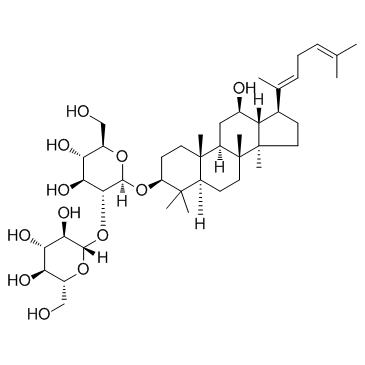186763-78-0
| Name | (8ξ,9ξ,12α,13ξ,14β,17β)-12-Hydroxy-4,4,7,10,14-pentamethyl-17-[(2 E)-6-methyl-2,5-heptadien-2-yl]gonan-3-yl 2-O-β-D-glucopyranosyl- β-D-glucopyranoside |
|---|---|
| Synonyms |
(3β,12β,20E)-12-Hydroxydammara-20(22),24-dien-3-yl 2-O-β-D-glucopyranosyl-β-D-glucopyranoside
Ginsenoside Rg5 |
| Description | Ginsenoside Rg5 is the main component of Red ginseng. Ginsenoside blocks binding of IGF-1 to its receptor with an IC50 of ~90 nM. Ginsenoside Rg5 also inhibits the mRNA expression of COX-2 via suppression of the DNA binding activities of NF-κB p65. |
|---|---|
| Related Catalog | |
| Target |
IGF-1R:90 nM (IC50) p65 COX-2 |
| In Vitro | Ginsenoside Rg5 plays a novel role as an IGF-1R agonist. Ginsenoside Rg5 binds to IGF-1R with an IC50 value of ~90 and its angiogenic activity is inhibited by IGF-1R knockdown. To investigate the possible interaction of Ginsenoside Rg5 with IGF-1R, a docking analysis is performed. Docking results show that Ginsenoside Rg5 binds strongly at two sites, A and B, with Kd values of 20 and 27 nM, respectively, to the cysteine-rich domain of IGF-1R. Pretreatment with Rg5 blocks the binding of radiolabeled IGF-1 to HUVECs with an IC50 value of ~90 μM, which is greater than an IC50 value of ~1.4 nM for unlabeled IGF-1[1]. The results from MTT assay show that MCF-7 cell proliferation is inhibited by Ginsenoside Rg5 treatment for 24, 48 and 72 h in a dose-dependent manner. Ginsenoside Rg5 at different concentrations (0, 25, 50 and 100 μM), induce cell cycle arrest in G0/G1 phase through regulation of cell cycle-related proteins in MCF-7 cells[3]. |
| In Vivo | Ginsenoside Rg5 inhibits the mRNA expression of COX-2 via suppression of the DNA binding activities of NF-κB p65 in lipopolysaccharides (LPS)-stimulated BV2 microglial cells. Rg5 pretreated group mice show declined expression of NF-κB p65 and COX-2. In the group treated with low dose of Ginsenoside Rg5 (10 mg/kg), there is remarkable tubular damage and infiltration of inflammatory cells. However, at the higher dose of Ginsenoside Rg5 (20 mg/kg), tubules markedly appeare histologically normal and no inflammation and cast formation is observed in kidney tissues[2]. |
| Kinase Assay | HUVECs are cultured in 24-well plates overnight. The cells are changed to serum-free M199 and incubated for 1 h. The medium is removed, and cells are incubated with fresh serum-free medium containing 0.1 μM-50 mM Ginsenoside Rg5 at 37°C for 20 min followed by the addition of 50 μL (1 μCi) of [125I]IGF-1 and then further incubated for 10 min. The medium is decanted, and cell plates are washed twice with serum-free medium. Cells are lysed in 300 μL of 0.1 N NaOH solution containing 0.1% SDS, transferred to scintillation vials, and mixed with 1 mL of Ultima Gold mixture solution. Cell-associated [125I]IGF-1 is analyzed in a scintillation counter. The nonspecific binding is determined by coincubation with unlabeled IGF-1 (50 nM)[1]. |
| Cell Assay | MCF-7 (HER2-/ER+) and MDA-MB-453 (HER2+/ER-) human breast cancer cell lines are maintained using RPMI 1640 medium supplemented with 10% (vol/vol) FBS plus 100 units/mL Penicillin and Streptomycin in a 5% carbon dioxide air incubator at 37°C. Cell cytotoxicity is measured by MTT assay. Cells are seeded in 96-well tissue culture plates at the density of 0.2×104 cells per well with 100 μL medium, and are allowed to become attached for 24 h. One hundred microliters of the medium with different concentrations of Ginsenoside Rg5 (e.g., 0 μM, 25 μM, 50 μM, and 100 μM) are added to each well. At indicated times, 30 μL MTT stock solution (3 mg/mL) are added to each well. After culturing the cells at 37°C for 2 h, DMSO is added to dissolve the formazan crystals. The absorbance is read at the wavelength of 540 nm with a microplate reader[3]. |
| Animal Admin | Mice[2] Male ICR mice (6 to 8 weeks old), weighing 25-27 g, are used. After acclimation for one week, mice are randomly assigned into 4 experimental groups with 8 mice in each group: normal control, Cisplatin control, and Cisplatin+Ginsenoside Rg5 groups (10 and 20 mg/kg, respectively). Ginsenoside Rg5 is administered intragastrically at the dose of 10 and 20 mg/kg for 10 days. On the 7th day, animals in Cisplatin control and Ginsenoside Rg5-treated groups receive a single intraperitoneal injection of Cisplatin (25 mg/kg) to induce nephrotoxicity in mice. Mice are anaesthetized with pentobarbital, subsequently sacrificed at 72 h after Cisplatin injection (Day 10). Blood samples are collected and then centrifuged at 3000 rpm to separate the serum and stored at -20 °C for determining blood urea nitrogen (BUN) and creatinine (CRE) levels. |
| References |
| Density | 1.3±0.1 g/cm3 |
|---|---|
| Boiling Point | 855.6±65.0 °C at 760 mmHg |
| Molecular Formula | C42H70O12 |
| Molecular Weight | 766.998 |
| Flash Point | 471.2±34.3 °C |
| Exact Mass | 766.486755 |
| PSA | 198.76000 |
| LogP | 6.81 |
| Vapour Pressure | 0.0±0.6 mmHg at 25°C |
| Index of Refraction | 1.592 |
| Storage condition | -20°C |
| RIDADR | NONH for all modes of transport |
|---|


